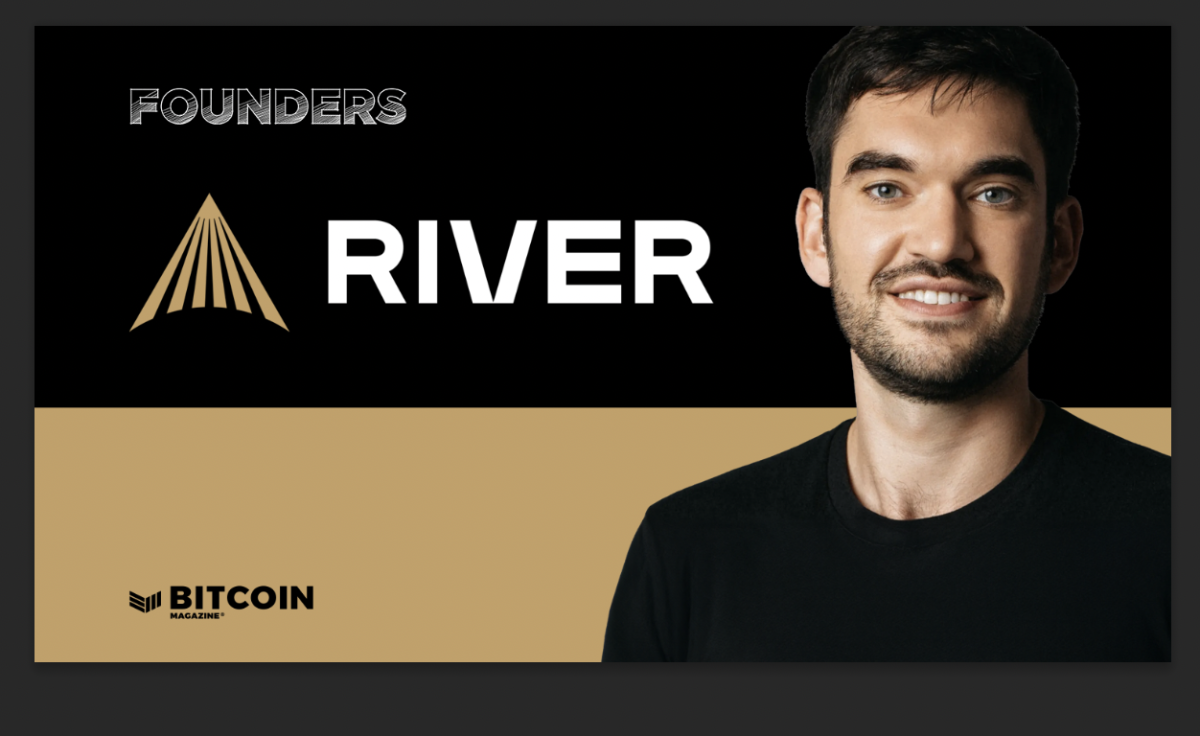Month: August 2024
USD weakness to continue, more pronounced in Asia: Nomura
Post Content
Myanmar households crippled as currency tumbles to record low
Post Content
Asia FX steady as yen rally cools, dollar at 7-mth low amid rate cut bets
Post Content
What is the impact of the yen carry trade on earnings? Jefferies weighs in
Post Content
River: A Bitcoin Brokerage Built From The Ground Up
Company Name: River
Founders: Alexander Leishman
Date Founded: February 2019
Location of Headquarters: Columbus, OH
Amount of Bitcoin Held in Treasury: Proof of reserves launching soon
Number of Employees: 50
Website: https://river.com/
Public or Private? Private
How do you make a bitcoin-only brokerage profitable? The answer isn’t complicated.
You offer the highest quality services to as many people as possible for a good price.
This is the strategy Alexander Leishman and the team at River employ.
And River’s high-quality services largely hinge on staying true to what Leishman calls “the Bitcoin ethos,” at the core of which is the “not your keys, not your coins” philosophy.
“At River, we decided to take the slow, hard way, which allowed us to build our own custody systems and actually custody our clients’ Bitcoin and operate as a financial institution,” Leishman told Bitcoin Magazine.
Building on a strong foundation is clearly important to Leishman, someone who operates from his own notable educational and professional base.
The Engineer
Leishman completed an undergraduate degree in aerospace engineering and holds a master’s degree in computer science from Stanford.
His résumé boasts of experience ranging from a robotics engineering intern to a cryptography researcher at Stanford to a software security engineer for Airbnb.
In so many words, he has notable technical abilities — the type you’d want someone who secures millions of dollars in bitcoin on behalf of clients to have.
And even with all of his knowledge and experience, he’s still humble enough to be mindful of the risk involved in what he does.
“Our number one focus above all else is always don’t fuck up,” said Leishman.
“People really underestimate that that doesn’t happen by default. You have to actively spend 50 plus percent of your resources to contain entropy and make sure you’re always improving systems and procedures, building the automation and building everything you need to contain those risks and preempt new risks,” he added.
“That’s actually what the majority of the work goes into.”
These are sobering words in an industry that has a reputation for exchanges going bust and/or losing client funds. And Leishman is aware of this.
“It turns out in this industry there aren’t a whole lot of trustworthy people,” said Leishman.
“We’ve seen even the most regulated trust companies go bust. They’ll tell you, we have this certification and this license and this, this and this. Then, when it all comes out, you find out this guy was having people deposit coins to a Ledger that they lost the key to three years ago,” he added.
“That’s why we do things ourselves.”
Why Bitcoin?
Given how difficult it is to safely run a Bitcoin company and the fact that, with his credentials and experience, Leishman could make a good living in a number of fields, why did he gravitate toward Bitcoin?
“The reason that I got into Bitcoin was because I went down the economics rabbit hole on the side in college,” recalled Leishman. “I started reading about Austrian economics and eventually read The Denationalization of Money by Friedrich Hayek.”
He was drawn to the idea of challenging central banking as he became more aware of the dangers of centralized power structures of all types — from The Fed to supranational entities like the EU.
Before finding bitcoin, Leishman wanted to create his own form of money that the government couldn’t control.
“I wanted to create a commodity-backed money, but it would have been centralized,” he said.
“I couldn’t really figure out how to do it without going to jail, and I didn’t know how to make a business out of it,” he added.
“When I came across Bitcoin I was like ‘My gosh this fulfills the prophecy — this is going to change everything.’ I just knew I had to work on it.”
And work on it he did. After college, he completed a coding bootcamp and then headed west to San Francisco to find work in what was then ground zero for the Bitcoin industry in the US.
Bitcoin And The Bay Area
“I didn’t have a job before I moved to the Bay Area,” recalled Leishman. “I moved there because back then that’s where all the Bitcoin stuff was happening, and I wanted to be in the center of it.”
It didn’t take him long to find work, though. In March 2014, Leishman landed his first job in the Bitcoin space with a Taiwanese Bitcoin exchange called MaiCoin, which specialized in bitcoin trading and payments.
At MaiCoin, Leishman identified and fixed security vulnerabilities and built APIs used for merchant services.
Beyond his experience at MaiCoin, Leishman remembers his time in the Bay Area fondly.
“The culture was very different back then,” he said.
“There wasn’t really this concept of Bitcoin maximalism. No one was offended by new coins because people would basically use these things to experiment with new ideas,” he added.
“It was much more free, more academic, like people could try ideas without the economic component and without creating this dichotomy between scammers and legit people as much.”
From one angle, these might sound like strange words from someone who runs a bitcoin-only business. From another, one might imagine that Leishman learned more than a handful of lessons firsthand about why Bitcoin is different from all other crypto networks and assets during his time in San Francisco.
Plus, he said that “everyone knew Bitcoin was king — no one was trying to come at it.”
After MaiCoin, Leishman completed his graduate studies at Stanford, where he worked as a teaching assistant for a course on Bitcoin and other cryptocurrencies taught by Dan Boneh, co-founder of Stanford’s Computer Security Lab, and then built secure infrastructure for asset management for Polychain Capital, a crypto hedge fund.
By early 2019, he was ready to start his own endeavor.
Building River
Harnessing what he’d learned about crypto security and payments, Leishman set out to build a Bitcoin platform that not only featured a top-notch multisig security model for client funds at its core but also helped users more readily utilize bitcoin as a medium of exchange via the Lightning Network, as River provides users with custodial Lightning wallets.
Leishman explained building out all of the infrastructure for River is what distinguishes it from other companies like it. When brokerages use third-party custodians they give up control over what they can offer their clients.
“They can only use whatever their third-party decides to build,” said Leishman of exchanges that don’t build their own custodial infrastructure. “And the third parties are all multi-coin custodians that rarely prioritize Bitcoin stuff.”
With Leishman at the helm wearing the hats of CEO and CTO, River has a distinct advantage in forging its own path.
“Thinking like a good engineer leads to a good business,” said Leishman.
“I’m the person leading the company. I know how to build what we need to build. I know how to ship what we need to ship to serve our customers,” he added.
“For a company like ours, I think it is the right archetype.”
More Of The Same — For Now
While Bitcoin is becoming more popular as a store of value, Leishman thinks we still have a ways to go before it becomes a more widely accepted medium of exchange.
Plus, River’s bread and butter is its brokerage service.
“We make most of our money on our bitcoin brokerage,” Leishman said.
He also noted that River makes money off of its other services, like running two major Lightning nodes, but that the revenue produced from this pales in comparison to what the company earns from its brokerage service, which River continues to work to improve.
“There’s always more that we can be doing to make the process simpler and higher quality to sign up, buy — and custody feels like you have all your security needs covered,” Leishman said.
“Also, really where the hard work is, is the interface with the fiat system. And so the big trend that we’re leaning into in the next three to five years, in my opinion, is that Bitcoin is going to become, still growing as a store of value,” he added.
“We’re entering an era where people are going to be saving in dollars and Bitcoin, and the seamless back and forth between Bitcoin and fiat is where we’re focused.”
‘Kamala-mentum’ is putting ‘Trump trades’ on ice as dollar loses steam
Post Content
Ledn Secures Industry First $50M Bitcoin-Backed Syndicated Loan from Sygnum
Ledn, a leading digital lending platform, has officially secured a $50 million Bitcoin-backed syndicated loan from Sygnum, a Swiss digital asset banking group with ~$4.5 billion in client assets, according to a press release sent to Bitcoin Magazine.
Ledn and @sygnumofficial Just Made History! 🎉
Sygnum Bank issued the industry’s first Syndicated BTC-backed $50M (USD) Loan to Ledn
A giant leap for the industry and our clients! 🚀 pic.twitter.com/z8dVRD2ERt
— Ledn (@hodlwithLedn) August 20, 2024
The $50 million loan, syndicated among Sygnum’s institutional clients, will fuel Ledn’s expansion in retail lending, offering clients enhanced opportunities to access capital using their Bitcoin holdings as collateral. The collateral will be held in qualified custody, aiming to ensure the highest levels of security and compliance with regulatory standards.
“With the first Bitcoin-backed syndicated loan from a fully regulated bank, Sygnum is excited to support Ledn’s future growth and kick-start a new market for institutional lenders and borrowers as the crypto ecosystem matures,” said Benedikt Koedel, Head of Credit and Lending at Sygnum.
This loan between Ledn and Sygnum reflects the ongoing maturation of the Bitcoin industry and its shift towards having fully regulated institutional-grade financial services. The transaction is aimed to build confidence among traditional financial participants when it comes to Bitcoin-collateralized lending, potentially unlocking substantial liquidity for the sector around the existing $1.38 trillion syndicated loan market, stated the release.
“We’re proud to be working with Sygnum, a fully regulated Swiss bank, to set a new benchmark for transparency, counterparty quality, robust risk management practices, and institutional-grade lending standards,” said Adam Reeds, CEO and Co-Founder of Ledn. “We believe this marks the beginning of a new era of transparency and professionalism in digital asset financial services, and it aligns perfectly with our long-standing commitment to client asset security and regulatory compliance.”
Breaking Down Dirty Coin: The Documentary That Shatters Bitcoin Mining Myths
Bitcoin mining has long been embroiled in controversy. From Greenpeace’s high-profile “Change the Code, Not the Climate” campaign to Alex DeVries’ exaggerated claims about Bitcoin’s growing “water footprint,” the media often portrays Bitcoin mining as an environmental disaster in the making. For the general public, who are genuinely concerned about environmental preservation but lack in-depth knowledge of Bitcoin mining, these narratives are alarming. As a relatively young and seemingly complex industry, much of this misleading negative publicity sticks, while the significant societal benefits of Bitcoin mining are often ignored. This persistent fud has fueled a political crusade against Bitcoin mining, drawing in figures like Senator Elizabeth Warren, New York Governor Kathy Hochul, and even the European Central Bank (ECB). Senator Warren has labeled Bitcoin mining a national security threat, Governor Hochul signed a law in 2022 banning mining operations that rely on carbon-based power, and the ECB recently described Bitcoin as an “unproductive, energy-intensive technology that lacks social value and presents an obstacle to the EU’s climate goals.”
Bitcoin mining not only faces a branding problem but is also at risk of being regulated out of existence. With stakes this high, it is crucial to counter these misconceptions with truth in a way that the average person can understand. Enter Dirty Coin (DC), a compelling and award-winning documentary by Alana Mediavilla. I recently watched this documentary and was struck by its thorough research and its balanced portrayal of Bitcoin mining. It not only debunks the pervasive myths but also highlights the humanitarian impact of Bitcoin mining in both developed and emerging markets.
Are Environmentalists Wrong About Bitcoin Mining?
One of the documentary’s key points is that Bitcoin mining can actually incentivize the development of renewable energy projects. By providing a consistent demand for electricity, mining operations can help make renewable energy projects financially viable in areas that would otherwise struggle to support them. The film takes viewers on a global journey, showcasing Bitcoin mining operations that do everything from incentivizing the build-up of micro-grids to utilizing stranded energy from landfills that emit significant amounts of methane gas.
Perhaps the most inspiring revelation in DC is how Bitcoin mining is empowering underprivileged communities worldwide. In Malawi, for example, a small community is using surplus hydroelectric power to mine Bitcoin, providing a stable source of income and helping to secure their financial future. These socio-economic benefits of Bitcoin mining are conveniently ignored by critics who view everything through the lens of “orange coin bad.”
By highlighting these success stories, DC demonstrates that Bitcoin mining is not just about making money—it’s about leveraging technology to drive real-world change and improve lives. From the outset, the hidden realities of Bitcoin mining are explored in a comprehensible format for a non-technical audience. The documentary skillfully weaves together interviews with energy experts, environmental activists, government officials, and miners to present a nuanced and balanced view of the industry.
The film doesn’t shy away from addressing controversies surrounding the perceived significant carbon footprint of Bitcoin mining. It delves into the ongoing tug-of-war between New York-based Bitcoin miner Greenidge Generation (GG) and Sierra Club-supported environmentalists who are trying to shut down the company’s Seneca Lake plant. As DC explores this standoff in depth, it becomes clear that the staunch opposition to GG’s mining operation is rooted in misinformation that has been repeatedly debunked. When such controversies remain unchallenged, they create an environment conducive to executive actions like those implemented by Governor Hochul, which in turn fuel hostility toward the entire industry. The documentary also exposes the hypocrisy of the banking industry, which publicly criticizes Bitcoin as a tool for criminals while simultaneously serving ghouls like Jeffrey Epstein.
Debunking Myths About Bitcoin Mining
One of the most impressive aspects of DC is its ability to set the record straight on several persistent myths about Bitcoin mining.
Bitcoin Mining is Environmentally Destructive
DC directly confronts the widespread belief that Bitcoin mining is an energy-guzzling, environmentally damaging practice. It emphasizes the fact that a significant portion of Bitcoin mining operations utilize renewable energy sources that range from geothermal to hydro. Furthermore, by showcasing facilities that convert stranded energy, including methane from landfills, into electricity for mining, the documentary illustrates how mining actually mitigates environmental harm rather than exacerbating it.Bitcoin Mining Contributes to Grid Instability
DC counters the belief that Bitcoin mining destabilizes electrical grids. Instead, it highlights how mining can incentivize the development of micro-grids and provide a buffer for energy supply, thereby enhancing grid stability. This is particularly relevant in regions where excess energy is available but underutilized.Bitcoin Has No Real-World Benefits
DC also addresses the misconception that Bitcoin lacks real-world applications. In fact this is one of the worst takes that is the foundation of a lot of attacks against mining Bitcoin. After all, why should anyone be allowed to use more electricity than Sweden to mine magic internet money right? How dare they! By highlighting stories of communities benefiting from mining operations, the film illustrates how Bitcoin can provide financial opportunities and support local economies. Overall, DC presents a nuanced perspective on Bitcoin mining, encouraging viewers to reconsider their assumptions and recognize the potential for positive environmental and social impacts.
Final Thoughts
Whether you’re a long-time Bitcoin enthusiast or a skeptic, DC is a must-see documentary. It offers a balanced, insightful perspective on a complex issue and leaves you with a renewed appreciation for Bitcoin’s potential. Alana Mediavilla’s thoughtful approach and in-depth research make this film compelling for anyone interested in Bitcoin, environmental issues, or the intersection of technology and society. While it doesn’t shy away from the industry’s challenges, it also offers hope that with continued innovation, Bitcoin mining could help usher in a future of energy abundance for humanity.
This is a guest post by Kudzai Kutukwa. Opinions expressed are entirely their own and do not necessarily reflect those of BTC Inc or Bitcoin Magazine.
Dollar slumps ahead of payrolls revisions, Powell speech
Post Content
Dollar pressured lower amid hedge fund selling
Post Content






